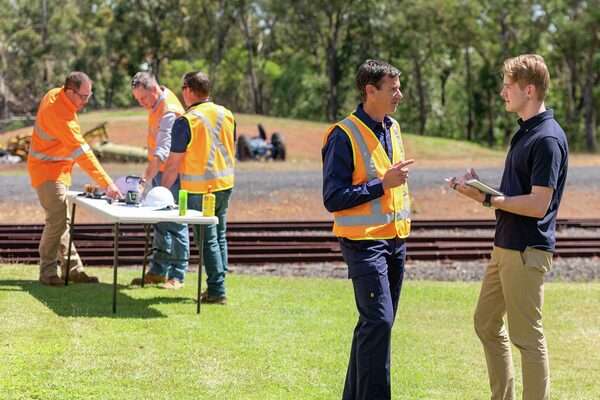Below you can explore a sample of the research programs that our university was involved in and collaborated on that have influenced government policy changes.
CQUniversity’s research has contributed to the development of the Review of the National Agreement on Closing the Gap: Study Report. Through the work of its Jawun Research Centre, CQU has secured $5 million in federal funding to conduct research aimed at advancing the Closing the Gap targets, focusing on the social, cultural, and environmental determinants of First Nations' health . This research supports the objectives of the National Agreement by providing evidence-based insights to inform policy and practice, thereby aiding in the effort to overcome entrenched inequality faced by Aboriginal and Torres Strait Islander peoples.
We have partnered with Foodbank Australia for the Enhancing Foodbank's Stakeholder Engagement project. This project is funded by Fight Food Waste CRC and focuses on a multi-stakeholder approach to minimise food waste and improve food security in Australia.
The Queensland Centre for Domestic and Family Violence Research (QCDFVR) is based in Mackay and contributes to the prevention of domestic and family violence by informing, promoting and supporting the actions of individuals, communities, services and governments through state-wide leadership in research, professional development, education and community engagement.
Research undertaken by CQUniversity's School of Nursing, Midwifery and Social Sciences has contributed to the Australian Department of Health's policies on palliative care and pregnancy care guidelines.
The mission of the Experimental Gambling Research Lab (EGRL) is to support the understanding of games of chance through experiment, simulation, and observation. Ongoing provision of EGRL research evidence, into various Australian State and Federal Governments’ policy and regulation of gambling, has informed proactive regulatory decisions including: to ban wagering advertising during general television viewing times, and ban promotion of various punter inducements; limit setting availability and mandatory gambling information messaging for online betting; youth-focused educational initiatives; the Australian National Self-Exclusion Register for pokies; and, Commonwealth-proposed mandatory warnings on computer games with gambling-like content.
The vision of the MSK group is to improve the quality of life and reduce the burden of musculoskeletal conditions in people living in regional Australia and beyond.
This priority area comprises research focused on keeping patients safe from preventable harm via improving the quality and safety of healthcare.
Our 10,000 Steps program is one of the largest and most successful health promotion programs in Australia. Originally developed by researchers to help raise awareness and increase participation in physical activity by encouraging the participant to accumulate ‘incidental’ movement as part of everyday living, the program’s impact has gone far beyond awareness and participation and was just recently ranked ‘high’ in the Australian Research Council’s (ARC) Impact and Engagement Assessment.
The Appleton Institute is one the flagship research institutes at our University. The Appleton Institute is a multidisciplinary research institute with a focus on health and well-being at work, rest and play.
Research in CREATE's Education for Global Competence and Sustainable Development cluster spans:
CQUniversity researchers are engaged as the preferred supplier to act as critical friends and researchers for each of the Phases of the Queensland Department of Education International’s (DEi) Global Competence Pilot Program (the Pilot). The aim of the pilot is to design a Global Competence Framework based on the OECD PISA framework and build supporting resources for implementation through a collaborative consultation process with teachers and leaders from Queensland state schools.
Researchers in CREATE's Education Justice and Innovation (EJI) cluster work with educators and learners to devise solutions to equity-related education problems in a range of contexts including:
STEM Central is a multidisciplinary team who conduct research, educational experiences, and community engagement events. We actively collaborate with local, State and National groups. We work in partnership with Government, industry, educational institutions, and community organisations.
CQUniversity in collaboration with community service entities and other universities has developed the Choices program to educate year 12 school students on safe behaviour in their post year 12 school celebrations.
WinTech (Women in Technology) STEM club is committed to improving gender disparity in Science Technology, Engineering and Maths + Computing (STEM+C) education, and in doing so STEM+C workshops and mentoring opportunities are hosted every year for young and mature women across the community. These workshops are conducted in response to bringing change in STEM education, making female students more interested and more confident in taking up STEM+C subjects as their career.
The ‘Women in Agri-tech’ project will create and foster a strong network of females who will become leaders in digital literacy, STEM and entrepreneurship in regional, rural and remote areas. They will be guided and mentored by female researchers, professionals and entrepreneurs to develop engaging learning resources which will, in turn, inspire girls in the classroom to realise the opportunities available to them.
Women in Agri-tech offer a range of programs and events for students and women in agriculture. This includes the Pitch Competition and the free access to twelve learning modules suitable for Year 7-12 students featuring agri-tech tools and systems which were written by the participants of the Women in Agri-Tech Project.
CQUniversity’s research has contributed to the World Bank’s 2024 report, Water for Shared Prosperity, launched in conjunction with the 10th World Water Forum in Bali. The report presents a global framework for understanding how equitable water access is essential to sustainable development and social inclusion. The report explores the drivers and consequences of water inequality and climate-related water shocks.
CQUniversity’s research on the environmental impacts of renewable energy technologies has been cited by the United Nations in the Climate technology progress report 2024, reinforcing the university’s contribution to Sustainable Development Goal (SDG) 7: Affordable and Clean Energy. The referenced study, Environmental impact of renewable energy source-based electrical power plants, explores the sustainability and environmental trade-offs of solar, wind, hydroelectric, biomass, geothermal, tidal, ocean, and osmotic energy. By informing global discussions on how clean energy intersects with water access and climate resilience, CQU’s research supports efforts to transition to renewable energy systems that are both environmentally responsible and socially inclusive.
At CQUniversity, we have a wealth of research experts involved in major local, national, and international research projects focusing on sustainable business practices aligned with the Sustainable Development Goals. The industry linkages and research activities of WERG group members principally focus on the rapidly changing workplace environment, transformation in institutional and leadership practices, and emergent social, economic, regulatory, and policy challenges influencing business and society.
The vision of the Regional and Rural Economies research theme is to improve analysis and decisions around resource and sustainability issues in regional and rural areas using economic frameworks.
Key capabilities include:
CQUniversity’s research into the causes and context of injuries during the 2010/2011 Canterbury earthquakes has been cited in The Resilient Buildings Project – Stage 3, a New Zealand initiative focused on improving the structural safety and resilience of buildings. This contributes valuable evidence to support the design of safer, more resilient infrastructure in disaster-prone regions. CQU’s research has informed strategies to reduce human harm in future seismic events, demonstrating the university’s impact on advancing innovation and infrastructure that protects communities and supports sustainable development.
CQUniversity's First Nations Community Engagement Industry Guide Phase 1 was used by the Northern Australia Infrastructure Facility as selection criteria in their funding decision making.
CQUniversity's research influenced the practices and engagement processes of the QLD Child and Mental Health team.
CQUniversity partnered with Deadly Inspiring Youth Doing Good to develop a submission to the National Children’s Commissioner focused on the need for preventive programs that heal Indigenous young people. Programs that are responsive to a young person’s individual circumstances, their strengths, hopes and needs, while being inclusive of their family and community. This contributed to a change in response from the Queensland Department of Justice and Attorney general towards supporting the DIYDG service model.
The Whitsunday Regional Council is developing an Arts, Cultural and Heritage Plan and community feedback, visions and ideas have been gathered to inform the region’s Arts and Cultural and Heritage Plan. CQUniversity was awarded a contract to undertake community consultation and professional development to inform the development of the Plan, which is due for release in 2023. Using an arts-led engagement methodology across four phases, the team has developed a five year plan responding to community needs, priorities, and opportunities.
The plan will inform local policy and community activity within the Whitsunday region until 2028.
CQRASN is striving to deliver excellent regional arts programs and services to ensure that our Central Queensland communities are connected, creative and cultural communities to live and work. This project leads a series of activities and events across the Wide Bay and Burnett. Delivering workshops and forums, as well as networking and festival events.
CQUniversity contributed to global health research cited in the Global Resources Outlook 2024 – Bend the Trend: Pathways to a Liveable Planet as Resource Use Spikes, a major policy report addressing sustainable resource management. The cited studies, including the Global Burden of Disease Study 2019 and research on universal health coverage, highlight the interconnectedness of human health, environmental sustainability, and resource consumption.
CQUniversity’s extensive research on climate change, renewable energy, agriculture, health, and vulnerable populations has contributed to a range of influential international policy documents addressing the global climate crisis. These include the World Social Protection Report 2024–26, the Climate Technology Progress Report 2024, and Research and Innovation for Climate Neutrality by 2050. The university’s research—spanning topics from hydrogen energy and e-waste pollution to climate vulnerability in agriculture and disability—supports Sustainable Development Goal (SDG) 13: Climate Action.
Our Coastal Marine Ecosystems Research Centre (CMERC) has been established to work with coastal industries, communities and governing bodies to develop practical and sustainable solutions for our unique coast and marine environments. The following projects are examples of CMERCs commitment to research that influences positive change and influence on policy:
We are a partner in the Fitzroy Partnership for River Health and collaborated on research relevant to the Fitzroy Basin Report card. The purpose of this project is to provide technical, scientific advice and coordination through the Fitzroy Partnership for River Health (FRPH) Independent Science Panel to drive research to support the continuous improvement of the Fitzroy Basin Report Card. The project involves the implementation and review of data-based reporting products, including the annual Ecosystem Health Index, as well as general advice and review around water chemistry and environmental monitoring and reporting aspects within the Fitzroy River Basin.
We work with the Gladstone Healthy Harbour Partnership to monitor the health of Gladstone Harbour and is informed by open, transparent and independent peer-reviewed science, through an Independent Science Panel (ISP). The role of the ISP is to provide independent scientific advice on the piloting and system testing of the GHHP-endorsed Gladstone Harbour Report Card. This includes:
We partner with the not-for-profit organisation Fitzroy Basin Association to conduct research on environmental and agricultural issues.
Our Koala Research – CQ group was established in 1994 to collaborate with communities and industries to enhance koala conservation through research.
CQUniversity research has played a key role in shaping global and national policies that advance justice, human rights, and institutional integrity. Our work on topics such as misinformation in conflict zones, police responses to domestic violence, the rights of incarcerated pregnant women, and the link between animal abuse and family violence has been cited in policy reports including Artificial Intelligence and Human Rights, Police Training in Responding to Family, Domestic Violence, and Pregnant Women in State Prisons and Local Jails. This impactful research supports the development of more transparent, inclusive, and accountable institutions, promoting peace and protection for vulnerable populations worldwide.
We have partnered with Foodbank Australia for the Enhancing Foodbank's Stakeholder Engagement project. This project is funded by Fight Food Waste CRC and focuses on a multi-stakeholder approach to minimise food waste and improve food security in Australia.
CQUniversity Australia is a trading name of Central Queensland University
ABN: 39 181 103 288
RTO Code: 40939
CRICOS: 00219C
TEQSA: PRV12073

